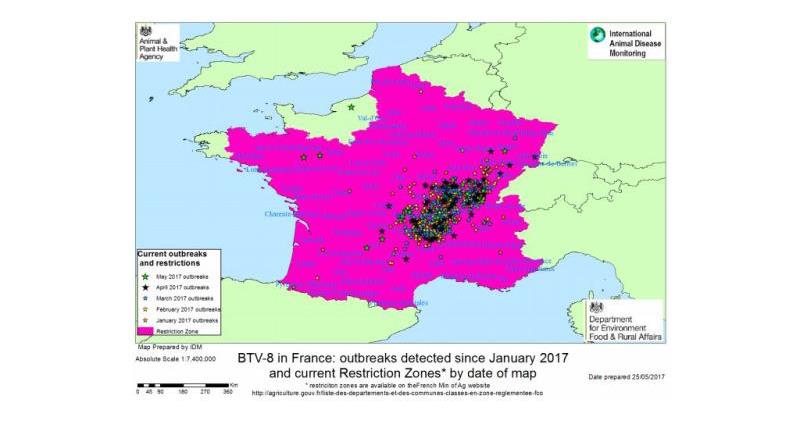The risk of an outbreak of Bluetongue virus in the UK is currently low.
Read the full risk assessment and the latest situation update from Defra
However, this may change; the risk of incursion via infected midges later in the summer depends on the level of disease on the continent, proximity to the UK, the vaccination status of animals in the UK and weather conditions.
Vaccination is the best way to protect livestock and a safe and effective vaccine is available in Great Britain. Livestock keepers should discuss with their vet if vaccination is an option which would benefit their business and, farmers across the south of England in particular, should look out for clinical signs of disease.
The holding where the virus was detected in northern France, is less than 150km from the south coast of England.
UK Chief Veterinary Officer Nigel Gibbens said: “We have robust disease surveillance procedures and continue to carefully monitor the situation in France, where Bluetongue disease control measures are in place.
“Our latest assessment shows the risk of outbreak in the UK is currently low, but the detection of the virus in northern France is a timely reminder for farmers to remain vigilant for disease and report any suspicions to the Animal and Plant Health Agency. I would also encourage farmers to talk to their vet to consider if vaccination would benefit their business.”
Any suspicion of disease must be reported immediately to the Animal and Plant Health Agency (APHA) on 03000 200 301.
More information on Bluetongue from Joint campaign Against Bluetongue (JAB)
What is Bluetongue?
Bluetongue disease is caused by a virus transmitted by biting midges, which are most active between May and October. Bluetongue virus can infect all ruminants (e.g. sheep, cattle, goats and deer) and camelids (e.g. llama and alpaca). Sheep are most severely affected by the disease. Cattle, although infected more frequently than sheep, do not always show signs of the disease.
Outbreaks of bluetongue affect farm incomes through reduced milk yield, sickness, reduced reproductive performance (failed pregnancies, abortion, central nervous system deformities in the calf or lamb) or, in severe cases, the death of adult animals.
Bluetongue virus does not affect people and consumption of meat and milk from infected animals is safe.
Bluetongue is a notifiable disease. That means if you suspect an animal is showing signs of disease you must tell the Animal and Plant and Health Agency (APHA) immediately. Failure to do so is an offence.
